Photographs: Fayaz Kabli/Reuters
France-based media rights organisation Reporters Without Borders issued its annual press freedom index for 2010, in which India dropped 17 positions and was ranked at 122 among the 178 ranked countries.
The ongoing unrest in the Kashmir Valley, which has killed more than 100 people in the troubled state, and the consequent suppression of media by the government forces and authorities were slated to be the principle reasons behind India's 'fall' in the press freedom index.
The Reporters Without Borders index measures the violations of press freedom in the world. It reflects the degree of freedom that journalists and news organisations enjoy in each country, and the efforts made by the authorities to respect and ensure respect for this freedom.
A score and a position is assigned to each country in the final ranking. They are complementary indicators that together assess the state of press freedom.
To compile this index, Reporters Without Borders prepared a questionnaire with 43 criteria that assess the state of press freedom in each country. It includes every kind of violation directly affecting journalists (such as murders, imprisonment, physical attacks and threats) and news media (censorship, confiscation of newspaper issues, searches and harassment).
And it includes the degree of impunity enjoyed by those responsible for these press freedom violations. It also measures the level of self-censorship in each country and the ability of the media to investigate and criticise.
Financial pressure, which is increasingly common, is also assessed and incorporated into the final score.
Click NEXT to see how other countries fared in the press freedom index..
North Europe remains the undisputed champ in press rights
Image: Journalists click photographs as Finland's President Halonen arrives at a EU summitPhotographs: Francois Lenoir/Reuters
Northern European countries retained their unsurpassable dominance in press rights, with Finland, Iceland, Netherlands, Norway, Sweden and Switzerland sharing the first position.
They have all previously held this honour since the index was created in 2002. Norway and Iceland have always been among the countries sharing first position except in 2006 (Norway) and 2009 (Iceland). These six countries set an example in the way they respect journalists and news media and protect them from judicial abuse, the report stated.
These countries are even continuing their progress. Iceland, for example, is considering an exemplary bill, the Icelandic Modern Media Initiative, that would provide a unique level of protection for the media.
Sweden distinguishes itself by its Press Freedom Act, which has helped to create a particularly favourable climate for the work of journalists.
'Press the favourite target in dangerous Afghanistan, Pakistan'
Image: Local boy peeks at a journalist's video camera in Saidon Kalacheh village in AfghanistanPhotographs: Bob Strong/Reuters
In Afghanistan (147) and in Pakistan (151), terrorist outfits bear much of the responsibility for their country's pitifully low ranking, the report noted.
Suicide bombings and abductions make working as a journalist an increasingly dangerous occupation in these areas of South Asia. And the governments have not slackened its arrests of investigative journalists, which sometimes more closely resemble kidnappings, the report stated.
The report also noted that in countries like Afghanistan, Pakistan, Somalia (161) and Mexico (136), a situation of chronic chaos and violence have taken its roots, in which the press has become the 'favourite target.'
Calling these places as the 'most dangerous countries in the world,' the report also quoted examples of French TV journalists St phane Taponier and Herv Ghesqui re who have been held hostage in Afghanistan for the past 300 days.
'Hellish Asian Communist regimes one of the worst'
Image: Protesters in Seouol burn portraits of North Korean leader Kim Jong-il and his son during a demonstration demanding the release of two US journalists held in North KoreaPhotographs: Reuters
The report did not mince its words much in describing the Asian Communist regimes. Asia's four Communist regimes, North Korea (177), China (171), Vietnam (165) Laos (168), are among the fifteen lowest-ranked countries of the 201o world press freedom index.
Ranked just one place behind Eritrea (178), 'hellish totalitarian' North Korea has shown no improvement. To the contrary, in a succession framework set up by Kim Jong-il in favour of his son, crackdowns have become even harsher, the report noted.
China, despite its dynamic media and Internet, remains in a low position because of non-stop censorship and repression, notably in Tibet and Xinjiang, it stated.
In Laos, it is not so much repression which plagues this country of Southeast Asia as its single party's political control over the whole media. On the other hand, Vietnam's Communist Party -- soon to hold its own Congress -- and its open season against freedom of speech is responsible for its worse than mediocre ranking.
Among the last thirty countries of the index are ten Asian nations, notably Burma (170), where the military junta have decided that the prior censorship system will be maintained despite the upcoming general elections in November, the report stated.
'Iran holds its position at the bottom of the index'
Image: Journalists work at the Gulf Daily News in Manama which was suspended after it published a column criticising Iranian electionsPhotographs: Hamad I Mohammed/Reuters
The report also noted Rwanda (169), Yemen (170) and Syria (173) have joined Burma and North Korea in the group of the world's most repressive countries towards journalists.
There is an identical situation in Syria and Yemen, where press freedom is fast shrinking away. Arbitrary detentions are still routine, as is the use of torture.
For its part, Iran (175) held its position at the bottom of the index. The crackdown on journalists and netizens which occurred just after the disputed re-election of Mahmoud Ahmadinejad in June 2009 only strengthened in 2010, the report stated.
The report was highly critical about Israel (86), which 'won' 18 places in the index, passing from the 150th to the 132nd place. The year 2010 was not exempt from press freedom violations on the part of the Israeli army, as evidenced by the cases of foreign journalists arrested on the flotilla in May 2010, or the Palestinian journalists who are regularly targeted by Tsahal soldiers' bullets.
Or the skirmish in South Lebanon last August, during which a Lebanese journalist was killed.
Iraq climbed 15 places (now 130), because safety conditions for journalists improved substantially in the country, despite the fact that three had died between September 1, 2009 and August 31, 2010 -- two of whom were murdered.
Since then, three deaths have occurred in less than one month. The withdrawal of American combat troops from Iraq at the end of August necessarily marks the start of a new era. The security of citizens, and particularly of journalists, should not be made to suffer for it, Reporters Without Borders felt.
'Access to information in US disappointing'
Image: A photographer takes pictures of White House in Washington, DCPhotographs: Jason Reed/Reuters
The United States of America (20) and Canada (21) still occupy the best positions in North America, but they lag behind some twenty other countries. The initial results of the Obama administration in terms of access to information are disappointing, the survey noted.
Cuba (166) gained several places after the wave of dissident releases -- notably the 'Black Springtime' of March 2003 -- which began in July 2010.
So far, five journalists remain imprisoned in the continent's only state which does not recognise any independent media. If the regime has made some concessions on behalf of its political prisoners in exchange for forced exile, it still has not made any with regard to public freedoms, the report stated.
The survey gave thumbs-up to New Zealand (8) and Australia (18) in terms of press freedom.
'France, Italy confirm their inability to reverse the repressive trends'
Image: Photographers shoot with their cameras during a photocall at the Cannes Film FestivalPhotographs: Erric Gillard/Reuters
There has been no progress in several countries where Reporters Without Borders pointed out problems. They include, above all, France and Italy, where events of the past year -- violation of the protection of journalists' sources, the continuing concentration of media ownership, displays of contempt and impatience on the part of government officials towards journalists and their work, and judicial summonses -- have confirmed their inability to reverse this trend, the report noted.

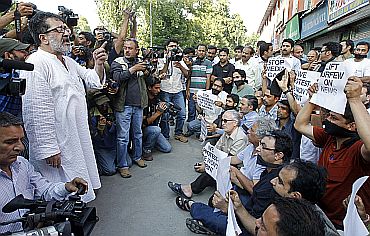
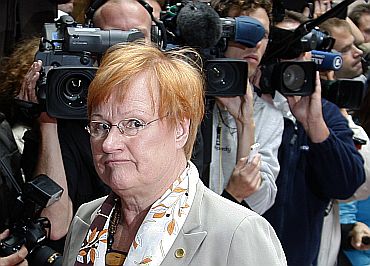
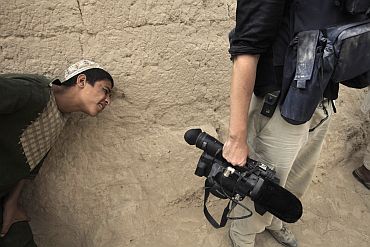
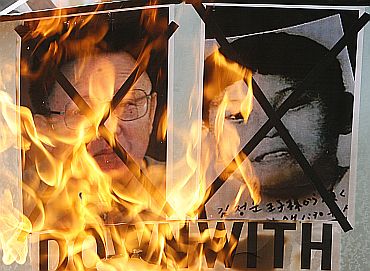

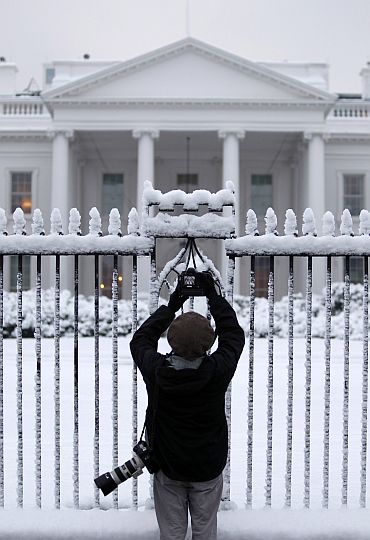
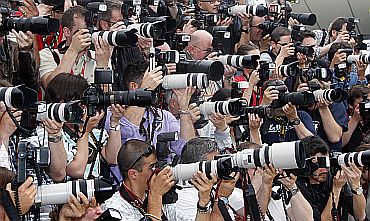
article